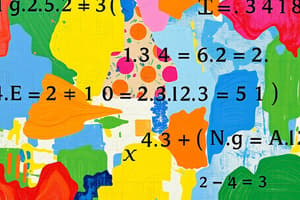Podcast
Questions and Answers
What is the purpose of variables in algebraic expressions?
What is the purpose of variables in algebraic expressions?
Which of the following is NOT an example of a constant in algebra?
Which of the following is NOT an example of a constant in algebra?
In the expression $2024 - t = ext{age next year}$, what does the variable $t$ represent?
In the expression $2024 - t = ext{age next year}$, what does the variable $t$ represent?
Which term best describes a value like $18$ in algebraic expressions?
Which term best describes a value like $18$ in algebraic expressions?
Signup and view all the answers
What role do constants play in algebraic expressions?
What role do constants play in algebraic expressions?
Signup and view all the answers
What does a term in an algebraic expression consist of?
What does a term in an algebraic expression consist of?
Signup and view all the answers
In the expression $3x + 2$, how many terms are present?
In the expression $3x + 2$, how many terms are present?
Signup and view all the answers
What is the exponent of $x$ in the expression $xy^2z^{3/2}$?
What is the exponent of $x$ in the expression $xy^2z^{3/2}$?
Signup and view all the answers
What type of terms have zero exponents?
What type of terms have zero exponents?
Signup and view all the answers
Where do coefficients appear in algebraic expressions?
Where do coefficients appear in algebraic expressions?
Signup and view all the answers
Study Notes
Algebraic Expressions and Their Building Blocks
Algebraic expressions form the foundation of algebra—they're essentially how we represent quantities using symbols, numbers, and operations like addition, subtraction, multiplication, and division. In this exploratory dive into algebraic expressions, let's break down their most fundamental components: variables, constants, and terms.
Variables
Variables, denoted by letters such as (x), (y), or even multiple-letter strings like (\text{height}) or (\text{speed}), act as placeholders for unknown values. They allow us flexibility when solving equations and expressing relationships between different elements under consideration. For example, if you want to write an expression for someone's age next year, given they were born on January 1st, 2000, you might use the variable (t) to indicate time elapsed since birth, creating an expression like (2024 - t = \text{age next year}).
Constants
Constants, on the other hand, are specific, fixed numerical values that don't change throughout an equation. Examples of constants include integers ((7)), decimals ((9.8)), fractions ((\frac{2}{3})), and the values assigned to variables themselves once solved or determined through experimentation. For instance, if your friend turned 18 years old last month, then the constant value related to his/her age would be (18). Likewise, if you know the exact height of a chair is (56) centimeters, then (56) becomes a constant within any equation involving it.
Terms
A term refers to part of an expression consisting of one variable with its corresponding coefficients and exponents as well as constants. Each distinct product of variables, multiplied by potential scalar factors (constants), comprises a single term. Here's some terminology applied to these building blocks:
- If there isn't any variable present, the expression represents only a constant number. Example: (3x + 2) has two terms: (3) and (2).
- Constant terms have zero exponent because there's no variable raised to any power; examples include (5) and (-\pi).
- Coefficients appear before variables in expressions. In our earlier example, (3) serves as the coefficient of (x).
- Exponents denote how many times each variable appears within a certain term. A base (variable) gets multiplied by itself according to the specified exponent. In the expression (xy^2z^{3/2}), the exponent of (x) is (1), while those of (y) and (z) are (2) and (\frac{3}{2}), respectively.
Now that you understand the basics of algebraic expressions, variables, constants, and terms, you can grasp more complex mathematical concepts more easily as you progress through the realm of algebra!
Studying That Suits You
Use AI to generate personalized quizzes and flashcards to suit your learning preferences.
Description
Delve into the foundational aspects of algebraic expressions by exploring variables, constants, and terms. Learn how variables act as placeholders for unknown values, constants are fixed numerical values, and terms are the building blocks of expressions consisting of variables, coefficients, exponents, and constants.




